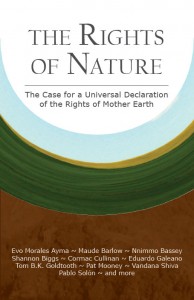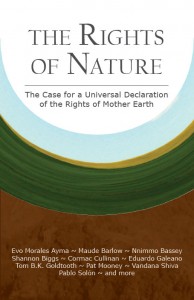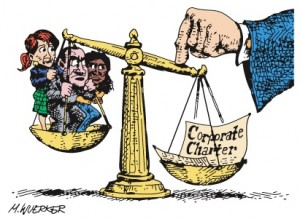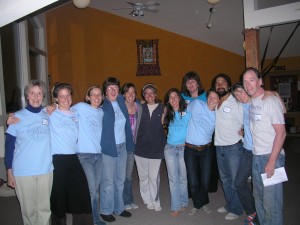As Earth Day approaches, can we envisage for ourselves a future based not on exploiting nature as property but upon recognizing that nature has inherent rights to exist, thrive, and evolve? A growing number of people in the Rights of Nature movement are saying, “yes, we can – and we must! “
Global Exchange is excited for the release of a new book next week, Rights of Nature: Making a Case for the Universal Declaration of the Rights of Mother Earth, co-developed by Global Exchange, the Council of Canadians, and Fundacion Pachamama. This revolutionary new book reveals the path of a movement that is driving the cultural and legal shift that is necessary to transform our human relationship with nature away from being property-based and towards a rights-based model of balance. The book gathers the unique wisdom of indigenous cultures, scientists, environmental activists, lawyers, and small farmers to make a case for how and why humans must work to change our current structures of law to recognize that nature has inherent rights.
The question of Rights for Mother Earth will be introduced to the United Nations on April 20th in New York during a session on ‘Harmony with Nature’. Put forward by Bolivia, it is the first step toward what many believe will culminate in the adoption of the Declaration on the Rights of Mother Earth in the months to come. At the U.N., Speakers including Dr. Vandana Shiva, Maude Barlow, Cormac Cullinan, Martin Kohr, Ambassador Pablo Solon, among others, will be making a case for nature’s rights. A companion piece for the Universal Declaration on Human Rights, this emerging Declaration – backed by enforceable laws around the world – seeks to wholly redefine our human relationship with all other species from one of dominance to one of harmony.
Please join us for two very special book launch events around the Rights of Nature coming up this month, in New York and in San Francisco. Both events will also feature the launch of the 2nd edition of Cormac Cullinan’s cutting-edge book, Wild Law: A Manifesto for Earth Justice. Join esteemed environmental activists and co-authors of the book including Maude Barlow, Bill Twist, Pablo Salon, Vandana Shiva, Cormac Cullinan, and Shannon Biggs for a conversation around the emerging Rights of Nature movement at these East and West coast launches:
New York book launch: Nature Has Rights
- When: Wednesday, April 21st 6:30-8 p.m.
- Where: CUNY Graduate Center, Proshansky Auditorium, 656 5th Ave (corner of 34th street) New York, NY.
San Francisco book launch: Nature Has Rights
- When: Wednesday, April 27th 7:00-9:00 p.m.
- Where: The First Unitarian Universalist Church – located at 1187 Franklin Street (at Geary) San Francisco, CA
Both events are free and open to the public.
For more information or to order a copy of the book:
Contact Kylie Nealis – kylie@globalexchange.org. The book price is $15 including shipping within the US. For international orders email Kylie Nealis – kylie@globalexchange.org for shipping price.






